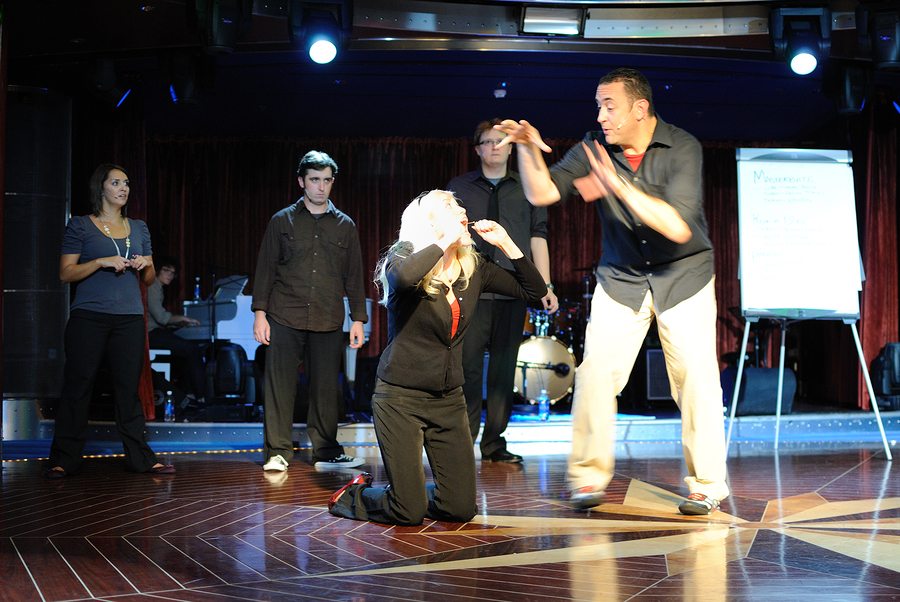Ever watched an improv show? If you’re not familiar with improv, it’s a live stage performance where actors have no idea what they’re actually going to do and say.
Usually, they’ll start a show by having someone from the audience yell out a word, and with that word as a theme, the actors will play off each other to create either a scene or an entire play full of interwoven storylines.
It’s fascinating to watch. Great improvisers can put on a full show that’s so compelling and so entertaining, it’s hard to fathom that nothing was actually scripted.
Recently, I signed up for improv classes to try something new, move past my off-stage comfort zone, and join the likes of Tina Fey, Will Ferrell, and Steve Carell (who all got their start from improv).
While taking these classes, I learned something I didn’t expect — I realized the basics of improv go hand-in-hand with becoming better at writing. How? It all comes down to three of the basic rules of improv acting.
Rule #1: Set the Scene with Specifics
IMPROV: No props are used in improv, so everything you say and do needs to paint a picture with specific details. Dialogue between you and your scene partner should include clues on where you are, how you know each other, and what you’re doing. If you miss these, you might end up with a confused, bored audience.
On a similar note, it’s best to create two characters who have known each other for a while rather than introduce two strangers. If characters have a common familiarity, a lot of complexities to the relationship could come about.
WRITING: When you write, be clear on the audience you’re writing to and what you’re trying to convey. You should write conversationally, as if you’re writing to someone you already know. Want to write about fishing tackle? Use words that assume you’re chatting with one of your “fishing buddies at the tackle shop.
If you’re writing advertising copy, be specific about what you’re selling, why it’s worth buying, and how the prospect will benefit. The more you describe the qualities of a product or service, the more it stands out from the competition.
Rule #2: Tell a Story
IMPROV: You need to come up with a plot to really entertain your audience. What is the story about? How does a problem thicken the plot? How is it resolved?
Intriguing improv shows follow a systematic storytelling formula:
- “Once upon a time”
- “And every day”
- “Until one day”
- “And because of that”
- “Until finally”
- “And ever since then”
You can come up with many amazing characters and concepts by keeping a basic storytelling framework.
WRITING: Storytelling is a writing strategy that works like a charm for copywriters. Stories help introduce businesses, highlight their unique qualities, and present memorable info about products or services.
Let’s say you’re writing an About page on a website for a client. Instead of creating a basic bio, use a story format to make things a little more interesting. Introduce your client, write about her background, include a unique reason why she does what she does, and describe why it’s wise to hire her services.
Rule #3: You’ll have failures, but that’s okay.
IMPROV: When you’re on stage, you never know what’s going to happen. It’s live, it’s exciting, and it’s scary. You’re going to make mistakes and have bad scenes.
But, you’re also going to have amazing scenes that make the audience laugh so hard they fall out of their seats. That’s why diehard improv actors get on stage again and again. Laughter and applause from the crowd make it all worth the effort.
WRITING: As a writer, not every piece of writing you do will be great, especially when you’re just starting out. But that’s okay, because you’re learning as you go, honing skills. It’s worth the risk of failures, because the more you try, the more experience you’ll gain and successes you’ll find.
Life’s a Stage, Make Sure You Play
Improv enthusiasts have coined the term “playtime” when they get together and act. They love what they do, and when the rules of improv are mixed with creativity, the actors produce incredible performances.
The same goes for us Barefoot Writers. Think of your job more like playtime than work. This is fundamentally how to become better at writing. When you combine the rules of freelance writing with your own creative talents, you’ll find yourself enjoying a successful writer’s life and creating masterpieces.






